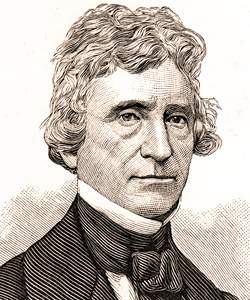Harmar Denny (Dickinson Chronicles)
Scholarship
Harmar Denny was born in Pittsburgh, Pennsylvania on May 13, 1794, the eldest son of Nancy Wilkins and Ebenezer Denny. Nancy Wilkins was a sister to William Wilkins, who also attended Dickinson College and rose to the United States Cabinet under President John Tyler. Ebenezer Denny was a Revolutionary War soldier and the first mayor of Pittsburgh. Harmar, named after a fellow officer of his father, was schooled in his home city and then entered Dickinson College. He graduated with the class of 1813.
Denny returned home to study law with Henry Baldwin, a future U.S. Supreme Court Justice. Baldwin took Denny into partnership when he was admitted to the bar in November 1816. Denny began his political career when he went to Washington, D.C. with James S. Craft to represent the western part of Pennsylvania at a canal convention in November 1823. He then served as a member of the state house in Harrisburg between 1824 and 1829. Late in 1829, Denny was elected as an Anti-Mason to fill the seat in the Twenty-first Congress made vacant when his uncle, William Wilkins, resigned. Denny was re-elected three times and served from December 15, 1829 to March 3, 1837, moving to the Whig camp and serving as a strong supporter of the protective tariff. He was not a candidate in 1836 and returned to private law practice in Pittsburgh. Denny remained active in politics, though, acting as a delegate to the state convention that reformed the Pennsylvania Constitution in 1837 and 1838, and serving as a presidential elector on the Whig ticket in 1840. He was urged to return to Congress in 1850, but ultimately declined.
By that point, Denny was heavily involved in the development of the Pennsylvania Railroad, incorporated in 1846, and the Ohio and Pennsylvania Railroad, incorporated in 1848. He was also president of the Pittsburgh and Steubenville Railroad in 1850. Denny became an important public figure in the area and served as a trustee of the Western University of Pennsylvania, now the University of Pittsburgh. He was also a devout Presbyterian who rose to elder in the First Presbyterian Church of Pittsburgh, which was led by Francis Herron, a member of Dickinson's class of 1794. In addition, Denny was director of the Western Theological Seminary in Allegheny and in 1848 was elected to the American Philosophical Society.
Denny married Elizabeth O'Hara in November 1817. Their children and their descendants carried on the strong family involvement in the western community. The family name is commemorated on the Dickinson College campus by Denny Memorial Hall, built on land donated by Mathilda Denny in 1896.
Harmar Denny died in Pittsburgh on January 29, 1852 after a long and painful illness. He was buried in the Allegheny Cemetery. Denny was fifty-seven years old.
Denny returned home to study law with Henry Baldwin, a future U.S. Supreme Court Justice. Baldwin took Denny into partnership when he was admitted to the bar in November 1816. Denny began his political career when he went to Washington, D.C. with James S. Craft to represent the western part of Pennsylvania at a canal convention in November 1823. He then served as a member of the state house in Harrisburg between 1824 and 1829. Late in 1829, Denny was elected as an Anti-Mason to fill the seat in the Twenty-first Congress made vacant when his uncle, William Wilkins, resigned. Denny was re-elected three times and served from December 15, 1829 to March 3, 1837, moving to the Whig camp and serving as a strong supporter of the protective tariff. He was not a candidate in 1836 and returned to private law practice in Pittsburgh. Denny remained active in politics, though, acting as a delegate to the state convention that reformed the Pennsylvania Constitution in 1837 and 1838, and serving as a presidential elector on the Whig ticket in 1840. He was urged to return to Congress in 1850, but ultimately declined.
By that point, Denny was heavily involved in the development of the Pennsylvania Railroad, incorporated in 1846, and the Ohio and Pennsylvania Railroad, incorporated in 1848. He was also president of the Pittsburgh and Steubenville Railroad in 1850. Denny became an important public figure in the area and served as a trustee of the Western University of Pennsylvania, now the University of Pittsburgh. He was also a devout Presbyterian who rose to elder in the First Presbyterian Church of Pittsburgh, which was led by Francis Herron, a member of Dickinson's class of 1794. In addition, Denny was director of the Western Theological Seminary in Allegheny and in 1848 was elected to the American Philosophical Society.
Denny married Elizabeth O'Hara in November 1817. Their children and their descendants carried on the strong family involvement in the western community. The family name is commemorated on the Dickinson College campus by Denny Memorial Hall, built on land donated by Mathilda Denny in 1896.
Harmar Denny died in Pittsburgh on January 29, 1852 after a long and painful illness. He was buried in the Allegheny Cemetery. Denny was fifty-seven years old.
John Osborne and James W. Gerencser, eds., “Harmar Denny,” Dickinson Chronicles, http://chronicles.dickinson.edu/encyclo/d/ed_dennyH.htm.



